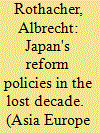| Srl | Item |
| 1 |
ID:
086021


|
|
|
|
|
| Publication |
2009.
|
| Summary/Abstract |
In periods of crisis, pundits and policymakers tend to scramble for historical analogies. This time, many have seized on Japan's notorious "lost decade," the decade of stagnation that followed a mammoth property bubble in the late 1980s. But this comparison is wrong. In Japan, the primary problem was pervasive dysfunction in the economy, which caused a banking crisis. In the United States, pervasive dysfunction in the financial sector has caused a deep recession in the economy as a whole. This financial dysfunction is not the result of structural flaws, as in Japan, but of grave policy mistakes. It is now being compounded by widespread investor panic.The consequences of the 2008 U.S. financial crisis will be different from Japan's slump in the 1990s for three reasons: the cause of the current crisis is fundamentally different, its scope is far smaller, and the response of policymakers has been quicker and more effective.Japan's malaise was woven into the very fabric of its political economy. The country has a thin social safety net, and so in order to protect jobs, weak domestic firms and industries were sheltered from competition by a host of regulations and collusion among companies. Ultimately, that system limited productivity and potential growth. The problem was compounded by built-in economic anorexia. Personal consumption lagged, not because people refused to spend but because the same structural flaws caused real household income to keep falling as a share of real GDP. To make up for the shortfall in demand, the government used low interest rates as a steroid to pump up business investment. The result was a mountain of money-losing capital stock and bad debt. Japan's crisis pervaded virtually its entire corporate world. In sector after sector, debt levels and excess capacity ballooned and profitability remained low. White-elephant projects, from office buildings to auto plants, were built on borrowed money under the assumption that if times got tough, the government and banks would bail out the debtors. But the banks were too poorly capitalized to write off bad loans. And for every bad loan, there was a bad borrower whose products were not worth the cost to make them. The cumulative total of bank losses on bad debt between 1993 and 2005 added up to nearly 20 percent of GDP.
|
|
|
|
|
|
|
|
|
|
|
|
|
|
|
|
| 2 |
ID:
096680


|
|
|
| 3 |
ID:
167679


|
|
|
|
|
| Summary/Abstract |
In this article, Sir David Warren, who was British Ambassador to Japan from 2008 to 2012, lays out the historical background to modern Japan, its political and economic structures (and international relationships); explores why we tend not to think of Japan as affected by the populism that we see in other Western democracies; and asks why Japan still presents itself as such a ‘different’ country.
|
|
|
|
|
|
|
|
|
|
|
|
|
|
|
|